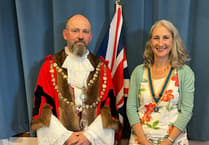MIA Thomas, a 19-year-old former Tavistock College student, is spending a year teaching and working in the local hospital at Nsanje, Malawi, before going to university to study medicine.
As Mia herself admits, having arrived in Malawi in September as an 18-year-old embarking on her big adventure, she has had a lot of growing up to do.
The following extracts are from Mia's emails home, providing a fascinating insight into a life far removed from our own in West Devon.
Mia's first email home:
IN Douglas Adam's 'Hitchhikers guide to the Galaxy', Ford Prefect famously chides Arthur Dent: 'Never go anywhere without your towel!'
I would agree with this lesson, except to add 'tea' before 'towel' when advising those about to embark on an uprootal to Africa.
At home in the UK the tea-towel never struck me as an important piece of equipment, far less a vital cog in the working of a household — now I know differently!
Nothing short of a multi functional (washing, cleaning, drying) miracle. I take my hat off to Mr Tea-towel.
I have found what — or rather how little — I miss, surprising on moving from my cosy middle-class English life to a hut in the poorest region of one of Africa's poorest countries — Nsanje, Malawi.
Living without running water has not been a huge challenge — the trips to the well provide a good chance to meet people and a daily workout besides.
Cockroaches in the toilet (or rather, hole-in-the-ground) at night makes the pre-bed preparations far more exciting.
The plentiful mosquitoes provide sport in trying to clap them dead before they bite, and showering using a bucket and a cup is a massive relief in 40 degree heat.
Vigorously hand washing clothes leaves one with a delightful sense of achievement, if rather dirty clothes.
The only thing I have found myself missing is . . . chocolate.
Rice, three meals a day, doesn't quite satisfy the sweet tooth in quite the same way.
My own adaptability has surprised no-one more than myself.
I thought the transition from my mummied 18-year-old existence to independence thousands of miles away from friends and family would be a hard one.
Instead, I wake up feeling empowered, capable and happy.
If only I had a tea-towel and a Snickers life would be complete!
The biggest cultural change has been the constant, overt friendliness of those living around me — Malawians are very proud of their title 'warm heart of Africa'!
There is no such thing as personal time when you could be sat outside chatting, there is no such thing as a shut door indicating those inside wish for peace.
Any letter I receive quickly gets snatched out my hands and read aloud to all present (my mother's tendency to make up words where none existing fit her meaning baffles the poor nosy Malawian readers!)
This extreme friendliness is both exhausting and refreshing at once.
When not working, cooking or cleaning you are always talking to neighbours, greeting people who come to have a look at the resident 'mazungu' (white person) or entertaining — and being entertained by — the children who come and play in the yard area.
I was able to learn the children's names within a week because they wear the same clothes every day.
They are poor, probably are living with a constant hunger and their toys consist of any cardboard boxes they can find in the rubbish heaps, and yet they are happy.
They play together and look after each other with a care (if of a rough, tough kind) that is seen so rarely in playgrounds at home, where children are as likely to be found in darkened rooms shooting each other on their consoles than outside running and playing.
Of course, life is far from perfect for these children — they are far skinnier than they should be and their clothes should be more material than holes.
But it makes me think that if I could give them everything children have in England, I wouldn't actually be making them any wealthier, whereas if I could give children at home the same sense of freedom and community, I would be giving something extremely beneficial.
I am learning new things everyday and am hotter and happier than I have ever been. November 2011
THIS month my work schedule has changed.
I am now doing two mornings a week at Lundu village school, the other three mornings a week at Nymadzere Primary school and afternoons at Nsanje District Hospital in the maternity ward.
I am enjoying all three activities more than I can say and all are challenging in their own ways.
The work at the hospital is incredible — especially for me going to medical school next year.
This very afternoon I helped resuscitate a baby that was born not breathing — helping involved holding a tube, don't worry, I am not doing solo deliveries yet!
The baby started breathing and then it opened its eyes and looked right at me.
I'm not sure I have ever experienced anything quite that magical.
The hospital is surprisingly modern, they clean it very well and for the most part it has the drugs the patients need.
At the end of the month, supplies start to run out, but careful management means they monitor levels well.
Teaching is amazing and challenging.
Nymadzere primary school is a government school, so has a huge intake of pupils, being the only free school in the area.
Teaching classes of minimum 90 students can be hard. Luckily I have big lungs for such a small woman — for I left England a girl and Africa has turned me into a woman — and can shout as loud as the best of them!
Not that I have to shout that often actually, they are inspiringly eager to learn.
I share classes with Fieke, my partner here — a Dutch girl who is (luckily!) very very lovely and an amazing person to be sharing a year and a house with – so marking 120 exercise books doesn't take quite as long!
I have found teaching at Nymadzere gives me the best feelings ever and the worst feelings ever.
Standing in front of 120 children having asked a question and getting nothing but blank uncomprehending stares back — their English being starter level at best — is an awful, awful feeling, but when they come to get their books marked and have got it right and look so proud is an amazing amazing feeling!
Teaching at Lundu village school is entirely different. It is a school run by the local NGO I am affiliated with out here.
Village life is where you see true poverty. I am living on the outskirts of the town and while life is basic here, I still have it good compared with villagers, for I have electricity.
Village children are stick thin and at the school most of them are orphans.
We teach them — about 80 in total but it differs from day to day — in the shade under a tree. They had a classroom but it fell down.
We are teaching them how to draw numbers and letters by getting them to scratch them on the dusty ground.
You need a lot of energy to keep their attention for three hours straight and they have not got even basic English.
Two weeks in we can now ask them 'What is your name?' and most will reply appropriately. (One lesson got confusing when a boy kept replying 'cement' and I kept asking 'what is your name?' in Chichewa and then in English, thinking he was misunderstanding me — before I realized his name was Cement.)
The really good thing about the school is that when the charity has money the children get fed a meal.
This is often the only proper meal they have in a day, and provides a lifeline for the children and their families. Sometimes when parents have died the grandparents take the children in and often they are too old to farm or work or are sick themselves, so the children go hungry.
Last week there was no money to buy maize-flour for the children. Seeing them walking home holding their unused plates was heartbreaking.
The really upsetting thing is that £1 could go such a long way towards providing these children with this vital meal and keep them coming to school.
This is starting to sound like an appeal and to be honest it is.
I am desperate to raise money to rebuild their classroom because with the rainy season coming lessons and food will be stopping.
Going there every week, getting to know the children and sharing time with them, I cannot bear to think of them without food and missing up to three months of lessons.
So with this update comes an appeal, please spare a thought for these children.
We all see charity appeals and are aware that poverty exists but it exists in a different world to us.
These two worlds MUST start coming together and the awareness needs to be constant and real for things to start to change.
We must not spend our days in guilt at the way we are able to live, but we must remember that for many, something as basic as food is not a given.
February 2012
LIFE Malawi-side is still treating me very well.
I have settled into a routine now and am less like a baby looking at everything as if for the first time.
Five months have now passed since I left British shores (that sounds far too poetic a phrase for Heathrow Airport!) and time, being that funny, elusive old measure, is playing tricks on me by simultaneously making me feel I have been here forever and have only just arrived.
The real winner of the 'most exciting news' category is that thanks to the overwhelming generosity of you amazing lovely people building of the new school building in Lundu village is to start!
These past few weeks I have been having meetings with village chiefs and banks, carpenters and bricklayers, I have been getting quotes for bricks (sold by the brick), and cement, nails, timber, labour, door frames, whitewash etc etc. I have learnt that building a structure of any sort is far more complex that I would have imagined.
Meanwhile we are still teaching under the tree and as porridge is now being given daily the class size has grown massively.
We split the students into younger and older groups and it's a pleasure to teach them.
One girl, Rosa, made my month simply by the expression on her face when I helped her put ro from ra, re, ri, ro, ru and sa from sa, se, si, so, su together to make her name.
The pure amazement and delight was perfection.
Teaching at the government school is also a joy; I have stopped feeling intimidated by the large class sizes and really enjoy having a laugh and teaching them.
Sometimes the sea of 120 students with their hands pointing desperately and everyone screaming 'try madam try' (as in 'let me try and answer') is a bit over-whelming, but it is infinitely better than having them stare uncomprehendingly at me — which happens less and less these days thank goodness!
Life in the hospital is as fascinating as ever. I have seen many births and am learning so much from it all.
Today was actually a hard day because a mother gave birth to stillborn twins because she herself was extremely anaemic and had severe pneumonia.
Stillbirths are horribly common due to lack of ante-natal care in the villages and women making long journeys to the hospital — sometimes when already in the first stage of labour — by foot.
Death is so much more commonplace here. At first I thought the clinicians were incredibly callous but I realize now it's just that they meet death so much more often that it's a part of daily life.
Today also saw a girl my age give birth to a healthy baby boy – and nearly break my hand by squeezing it!
At the start of January we had a short but extreme rainy season, the strength of the rains were unprecedented in my life and the noise it made on our tin roof was deafening!
Our rooms became temporary obstacle courses due to buckets and cups to catch drips and drying clothes — but it was also blessedly cool.
The rains brought a very new side of Malawi to light.
It was only when the heat diminished that I realised how much it affects life.
It makes life simpler because you can only think of the next step — 'I will go and get water, then sit and sweat and consider my next move' — but I do occasionally find myself becoming totally absorbed by watching a lizard dart over the ground, freeze like a statue and then dart onwards, or a beetle tottering along and (I like to imagine) mumbling equations or historical facts to itself like an old professor.
Then the rains came and suddenly I could plan days, weeks, ahead and see the bigger picture of plans and concepts again.
It's not that the heat makes me stupid, it's just that the little things take on more meaning.
Indeed in some ways its very Zen and maybe I am being elevated to a higher plane by the soaring temperatures!
Let me tell you all up there in your cool, fast thinking state of being, it is very, very sweaty here!!
The rainy patch also bought extreme flooding to some areas, cholera outbreaks in others. The road out of Nsanje was flooded for a while meaning supplies in the hospital and at the markets were scarce and we were all trapped down here.
Like most aspects of life here I can live and write jokey anecdotes about the goings on but behind that, there are people whose lives are being hugely affected by these things.
It's a harsh reality that hits me sometimes; this will always be a Big Adventure for me while for those around me, it's not playing at 'living with the locals', it's life.
It's having your home flooded away; it's having a sick baby at home and trying to get back into primary school education, it's carrying twins around in the heat for nine months only to have to give birth to them dead.
My experience here is primarily one of joy among a people who are not remotely self-pitying or down trodden, but from my western view of life, sometimes their reality seems very harsh.
I grew up with more food and luxuries than I could appreciate, but also in a society where my friends couldn't dance without being drunk and girls were obsessed with ounces and pounds on the scales.
This world is a topsy turvy place which is only one world in a physical sense; socially there are hundreds of different worlds which often seem to have nothing in common.
Mia
l Anyone who would like to make a donation to help Mia complete Lundu nursery school, and to extend the feeding programme in the villages, can drop a postal order or cheque made payable to Mia Thomas into the Times offices in Brook Street, Tavistock or West Street, Okehampton. Mia's mother, Kath Thomas, can be contacted on 01822 613375.




Comments
This article has no comments yet. Be the first to leave a comment.